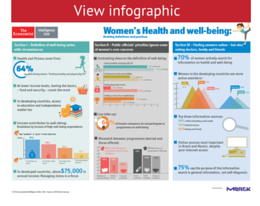This research is based on surveys with female consumers and public officials in five selected countries (France, Germany, India, Mexico and Brazil), as well as extensive desk research and in-depth interviews with 27 individuals with expertise in the topics under study.The research reaches the following key findings:
- Both women and policy-makers define women's well-being mainly in terms of physical health and fitness, but other factors are also considered
- The definition of well-being varies with personal circumstances
- Low participation rate in government programmes aimed at improving women’s well-being
- Mismatch between women’s priorities and those of government well-being programmes
- Women say they actively manage well-being, but evidence shows otherwise
- Higher-income groups more likely to take an active approach to health management
- Women in developing countries are more active information searchers than women in developed countries










